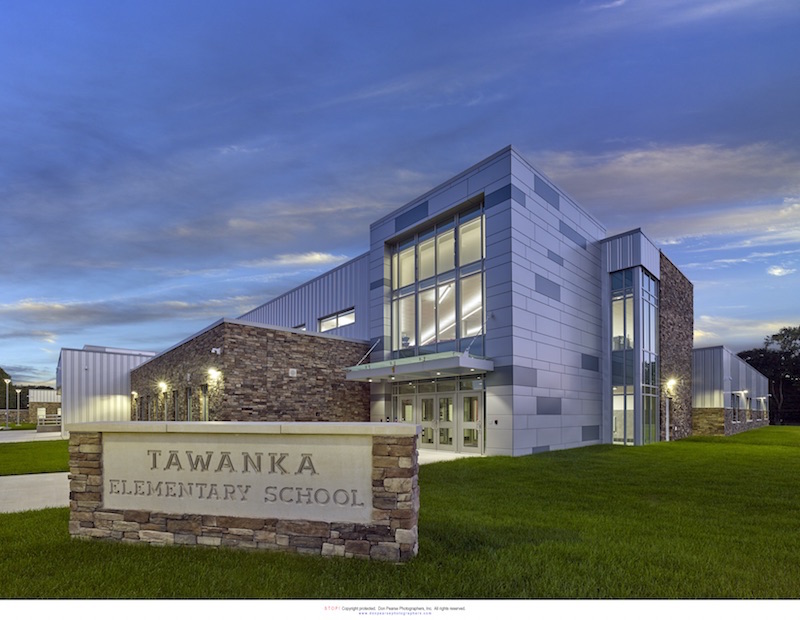Last Friday, Spiezle Architectural Group, a 63-year-old design and planning firm, held a ribbon-cutting ceremony for its new 15,000-sf office in Hamilton in central New Jersey.
Spiezle had recently relocated to its new headquarters from a former bank building in nearby Trenton, N.J., where the company had operated for over 25 years. Spiezle executives spent over a year looking for the right space, and its move included filling four 30-yard dumpsters with stuff that would not be traveling with Spiezle to its new home.
The headquarters relocation can be seen as the culmination of some big changes at the company over the past few years, including the appointment last November of 14-year company veteran Tom Perrino, AIA, LEED AP, as Spiezle’s President and CEO, after he served as interim CEO for 11 months.
Perrino is also a member of Spiezle’s five-person board of directors, which since March 2015 has been chaired by Anthony “Skip” Cimino, a Partner with the lobbying firm Kaufman Zita Group.
As part of its strategic growth plan, Spiezle last September acquired GS Architects, a Havertown, Pa.-based firm founded in 1999, which is strong in the hospital and interior design sectors. That transaction increased the employee-owned Spiezle’s workforce to 60, and extended its market reach to western Pennsylvania. “We are now servicing clients in Pittsburgh,” says Perrino.
The company considered vertically integrating into engineering, but decided against that at this time. However, it is seeking more landscape design work, after bringing on Adam Alexander, LLA, RLA, as its director of landscape architecture. Alexander, who had previously been with Partner Engineering & Science, has added a staff person and is looking to bring on a second.
Spiezle’s expertise now includes the educational sector (it has 30-plus Higher Ed clients and is a K-12 regional leader), acute healthcare, senior living, government, non-profit, and corporate office buildings.
Tom Perrino (right), Spiezle Architectural Group's President and CEO, with (from left) principals Scott Downie, AIA, LEED AP, and Steve Leone, AIA, LEED AP BD+C. They lead the employee-owned firm with 60 associates. Image: John Caulfield/BD+C
One of the firm’s more prominent assisted living projects, Parker at Monroe (N.J.), is a long-term care community with 96 residents, consisting of six “small homes” of 16 residents each, which are connected to a community center. Two small homes cater to residents with early to mid-stage dementias, three for residents with mid- to late-stage dementias, and one small home for people who are cognitively well but live with physical challenges.
Perrino says his firm generally prefers to avoid “fee-based” projects, and relies more on business from repeat customers. “We’re not a ‘one-and-done’ firm,” he says.
The company is involved in about 100 projects in various stages, more than 60 as AOR. Its recent commissions include the design for a new emergency services training center in Huntingdon County, N.J.; and a health sciences building at Neumann University in Aston, Pa. Voters in Hazlet, N.J., recently approved a $43 million bond for renovations at eight schools, for which Spiezle will be performing the design. The firm is also designing a $50 million science building at New Jersey City University scheduled for completion next year.
The company’s new headquarters, with its open-concept interior design that bathes the workspace with natural light, seeks to foster collaboration. Perrino says that Spiezle’s goal is “sustained growth,” not only for the company but also for its employees: it recently added “associate principal” to its organizational chart, as a way for its employee-owners to move up the ladder.
Related Stories
| Mar 2, 2011
How skyscrapers can save the city
Besides making cities more affordable and architecturally interesting, tall buildings are greener than sprawl, and they foster social capital and creativity. Yet some urban planners and preservationists seem to have a misplaced fear of heights that yields damaging restrictions on how tall a building can be. From New York to Paris to Mumbai, there’s a powerful case for building up, not out.
| Mar 1, 2011
Smart cities: getting greener and making money doing it
The Global Green Cities of the 21st Century conference in San Francisco is filled with mayors, architects, academics, consultants, and financial types all struggling to understand the process of building smarter, greener cities on a scale that's practically unimaginable—and make money doing it.
| Mar 1, 2011
How to make rentals more attractive as the American dream evolves, adapts
Roger K. Lewis, architect and professor emeritus of architecture at the University of Maryland, writes in the Washington Post about the rising market demand for rental housing and how Building Teams can make these properties a desirable choice for consumer, not just an economically prudent and necessary one.
| Mar 1, 2011
New survey shows shifts in hospital construction projects
America’s hospitals and health systems are focusing more on renovation or expansion than new construction, according to a new survey conducted by Health Facilities Management magazine and the American Society for Healthcare Engineering (ASHE). In fact, renovation or expansion accounted for 73% of construction projects at hospitals responding to the survey.
| Mar 1, 2011
AIA selects 6 communities for long-term sustainability program
The American Institute of Architects today announced it has selected 6 communities throughout the country to receive technical assistance under the Sustainable Design Assessment Team (SDAT) program in 2011. The communities selected are Shelburne, Vt., Apple Valley, Mn., Pikes Peak Region, Co., Southwest DeKalb County, Ga., Bastrop, Tx., and Santa Rosa, Ca. The SDAT program represents a significant institutional investment by the AIA in public service work to assist communities in developing policy frameworks and long term sustainability plans.
| Feb 24, 2011
Perkins+Will designs 100 LEED Certified buildings
Perkins+Will announced the Leadership in Energy and Environmental Design (LEED) certification of its 100th sustainable building, marking a key milestone for the firm and for the sustainable design industry. The Vancouver-based Dockside Green Phase Two Balance project marks the firm’s 100th LEED certified building and is tied for the highest scoring LEED building worldwide with its sister project, Dockside Green Phase One.
| Feb 24, 2011
New reports chart path to net-zero-energy commercial buildings
Two new reports from the Zero Energy Commercial Buildings Consortium (CBC) on achieving net-zero-energy use in commercial buildings say that high levels of energy efficiency are the first, largest, and most important step on the way to net-zero.
| Feb 24, 2011
Lending revives stalled projects
An influx of fresh capital into U.S. commercial real estate is bringing some long-stalled development projects back to life and launching new construction of apartments, office buildings and shopping centers, according to a Wall Street Journal article.
| Feb 23, 2011
London 2012: What Olympic Park looks like today
London 2012 released a series of aerial images that show progress at Olympic Park, including a completed roof on the stadium (where seats are already installed), tile work at the aquatic centre, and structural work complete on more than a quarter of residential projects at Olympic Village.
| Feb 23, 2011
Call for Entries: 2011 Building Team Awards, Deadline: March 25, 2011
The 14th Annual Building Team Awards recognizes newly built projects that exhibit architectural and construction excellence—and best exemplify the collaboration of the Building Team, including the owner, architect, engineer, and contractor.










